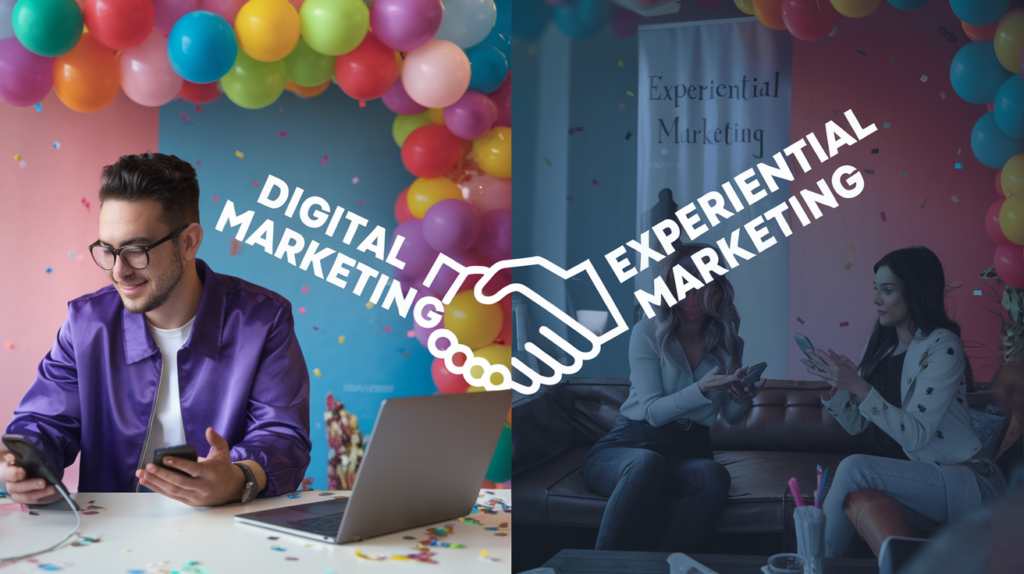In the fast-evolving world of advertising, combining Experiential Marketing with Digital Marketing has become a powerful way to engage audiences and build brand loyalty. While digital platforms allow businesses to reach large audiences, experiential marketing provides unique, real-life experiences that resonate with consumers on a deeper emotional level. This fusion creates a comprehensive marketing approach, blending the virtual and physical worlds to leave a lasting impact. As we move into 2024, businesses are increasingly recognizing the value of integrating these two strategies for maximum results.
What is Experiential Marketing?
Experiential Marketing focuses on creating memorable and immersive experiences for consumers, allowing them to interact with a brand in a tangible way. Instead of merely showcasing a product or service, experiential marketing engages consumers through events, activities, or hands-on experiences. These engagements can take many forms, from live events and pop-up shops to virtual reality experiences. The goal is to make the consumer feel like part of the brand story, creating a stronger emotional connection than traditional advertising methods.
When combined with digital marketing strategies, experiential marketing can amplify brand awareness and foster customer loyalty. By integrating these experiences into online campaigns, businesses can extend the reach of their physical events and create a cohesive, multi-channel marketing approach.
How Experiential Marketing Enhances Digital Marketing
Creating Deeper Connections with Consumers
One of the most significant advantages of Experiential Marketing is the ability to create meaningful, personal connections between the consumer and the brand. In a world saturated with online ads, offering a real-world experience cuts through the digital noise and gives consumers something they can remember. When these experiences are integrated into digital marketing strategies, such as social media campaigns or email marketing, they allow businesses to extend the impact of the event and reach a wider audience.
Boosting Brand Recall and Loyalty
People tend to remember experiences much better than they do banner ads or sponsored posts. By engaging with a brand on a physical or emotional level through experiential marketing, consumers are more likely to recall the brand when making purchasing decisions. Digital platforms can further reinforce these experiences by sharing event highlights, user-generated content, and follow-up promotions, ensuring that the consumer remains engaged long after the event has ended.
Combining Physical and Digital Interactions
A key advantage of experiential marketing is its ability to bridge the gap between the physical and digital worlds. For example, a brand might create a unique pop-up event that encourages attendees to share their experience on social media or participate in a digital contest. This combination of real-world interaction and digital engagement helps increase visibility and encourages organic sharing, making the brand’s reach go even further. Digital platforms provide a means to continue the conversation, driving follow-up interactions and engagement.
Amplifying Social Media Engagement
One of the best ways to integrate experiential marketing into digital marketing strategies is through social media. Experiences often prompt consumers to capture moments, post on social platforms, and share with friends. Brands can amplify this by creating hashtags, encouraging live streaming, or offering digital incentives for participants who share their experience online. In this way, the brand not only creates a memorable experience but also gains exposure across various digital platforms. By using social media, businesses can generate organic content and build a community of engaged followers.
Data Collection and Personalization
Experiential marketing also offers businesses an opportunity to collect valuable consumer data. At live events or brand activations, businesses can gather insights into consumer preferences, behaviors, and demographics. This information can be used to personalize future digital marketing strategies and enhance targeting efforts. By integrating data from experiential campaigns into digital platforms, companies can create more customized offers, promotions, and communications, making their digital presence more effective.
Enhancing Campaign Longevity
The impact of experiential marketing can extend far beyond the day of the event. By integrating experiential content into digital channels, brands can continue to engage with their audience long after the physical experience is over. This could include sharing photos or videos of the event on social media, publishing blog posts or case studies, or encouraging user-generated content. In turn, this keeps the brand top of mind and helps create lasting impressions.
Best Marketing Management Practices
For businesses looking to create an effective combination of experiential and digital marketing, applying best marketing management practices is crucial. This means aligning both the experiential and digital components under a single, cohesive strategy. Successful integration depends on clear objectives, consistent branding, and seamless coordination between both realms. Marketing managers need to ensure that the digital components—whether social media, email, or website—are working in harmony with the physical experiences. When these aspects are coordinated properly, businesses can maximize their marketing efforts and create a more impactful presence.
Leveraging the Power of Digital in 2024
As we head into 2024, it’s clear that the marketing landscape will continue to evolve, and brands must adapt to stay relevant. One of the most critical trends is the increased emphasis on blending physical experiences with digital engagement. As consumers become more digitally connected, brands that successfully integrate Experiential Marketing with digital strategies will be able to engage their audience on multiple levels. In this new age, the most successful businesses will be those that create unified and memorable experiences, both online and offline.
The Role of a Professional Marketing Company
Partnering with a professional marketing company can be the key to achieving a successful integration of experiential and digital marketing strategies. These firms specialize in executing campaigns that resonate with your target audience while optimizing for both physical engagement and digital reach. Whether it’s designing immersive events or creating compelling online content, working with marketing professionals ensures that every aspect of the strategy is executed effectively, driving brand growth and customer loyalty.
Benefits of Merging Experiential and Digital Marketing
The integration of Experiential Marketing and Digital Marketing Strategies is proving to be a winning formula for businesses looking to enhance their brand presence and engage consumers in innovative ways. From creating deeper connections with audiences to amplifying social media engagement and leveraging data for personalised marketing, the benefits of combining these strategies are immense. With the help of a professional marketing company, brands can navigate the complexities of these combined strategies, ensuring long-lasting success and deeper consumer relationships as we move into 2024 and beyond.



